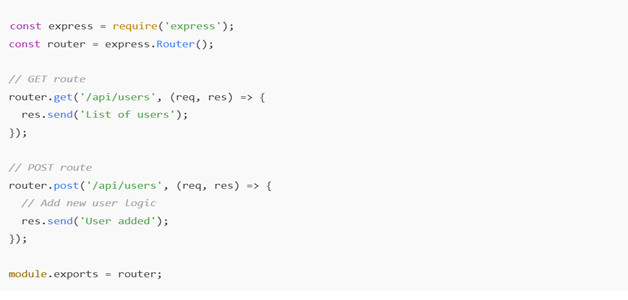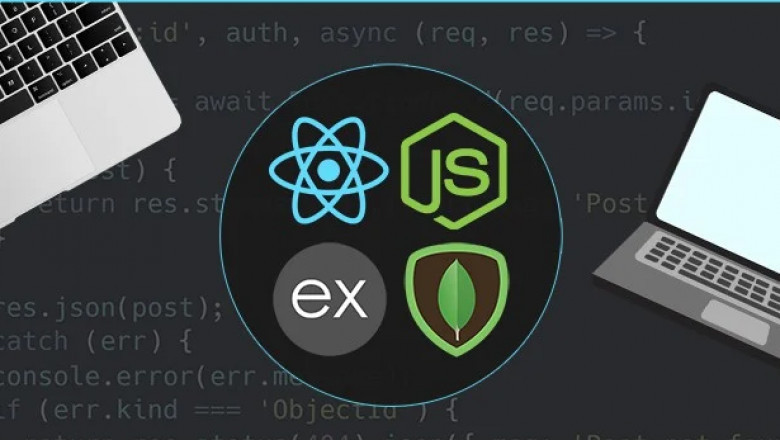views
Introduction
Express.js acts as the backend framework in the MERN stack. This technology stack consists of MongoDB, Express.js, React, and Node.js, and runs on HTTP requests and server-side logic. Routing, one of the fundamental features of Express.js, defines how the program reacts to various HTTP methods and URL paths. Express routing allows for dynamic content delivery and interaction through communication between the front-end and back-end. Creating systematic, scaled, and efficient full-stack web applications with MERN requires a thorough understanding of Express routing. Consider joining the MERN Stack Developer Course to learn more about Express routing. This article offers an overview of Express Routing in the MERN Stack and explores the importance of this process. Read this section to know more.
What Is Express Routing In MERN Stack?
In the MERN stack, Express.js serves as the backend framework managing HTTP requests and specifying the server response. The system for defining URL paths (routes) and connecting them to certain functions (usually known as controllers) that process requests and responses is called Express Routing.
Key Concepts of Express Routing
Ø Route Definition: In Express, corresponding HTTP methods define a route using “app.get()”, “app.post()”, “app.put()”, and “app.delete”. These paths manage client requests originating from the frontend (React).
Ø Syntax Example:

Ø Middleware Support: Middleware functions can be used by express routes to manage jobs such authentication, logging, or parsing request bodies prior to the execution of the last handler.
Ø Modular Structure: For improved maintenance, several files might separate routes. For instance, you might have a “userRoutes.js” file covering every “/api/users” endpoint.
Ø Integration with React: Express routes capture a React frontend's HTTP request to a backend API endpoint in a MERN application, process it by possibly engaging with MongoDB via Mongoose, and return the expected response.
In short, by mapping URL paths to handler functions, Express Routing in the MERN stack offers a simple and efficient approach to control server-side logic. This is an essential component of full-stack JavaScript development. Moreover, Express Routing in the MERN stack supports modular development and enables seamless interaction with frontend components.
Why Is It Necessary?
In the MERN stack, Express Routing is vital because it links the frontend (React) and the backend logic (Node.js with Express). It is a vital part of managing interaction between the client and the server since it governs how the server reacts to different HTTP requests. Aspiring MERN professionals can join Mern Stack Course in Hyderabad to learn how Express Routing if done on the MERN Stack.
1. Organized Request Handling
Express routing lets programmers manage several kinds of HTTP requests such as GET, POST, PUT, DELETE, in a systematic manner. Every route is related to a certain endpoint and purpose, which simplifies and aids in backend maintenance.
2. Separation of Concerns
Routing allows developers to divide API logic across resources such as orders, goods, consumers, thereby, managing it more efficiently. Especially in bigger projects, this modular design helps in debugging, collaboration, and code readability.
3. Dynamic Responses
Routes help to create dynamic responses driven by customer feedback. Fetching user information through a route like “/api/users/:id”, for instance, might yield varying data based on the user ID supplied in the URL.
4. Middleware Integration
Middleware functions that can be applied to particular routes for activities like authentication, data validation, error handling, and logging are supported by Express routing. This provides an additional level of functionality and protection.
5. API Endpoint Creation
Frontend-backend communication in the MERN stack is facilitated through RESTful APIs. Express routing is used to distinguish those APIs. The React frontend would lack any organized means of contact with the back end.
Conclusion
A well-defined API endpoint helps Express routing to effectively connect the frontend and backend in the MERN stack. It improves maintainability, encourages middleware for extra functionality, and guarantees structured, modular request handling. Moreover, many Mern Stack Interview Questions include questions on Express Routing, thereby making it an essential topic for professionals. Express routing is vital for creating effective, scalable, and secure whole-stack applications by allowing continuous data flow between React and the server. Its systematic approach in contemporary web projects helps to simplify development and cooperation.














Comments
0 comment